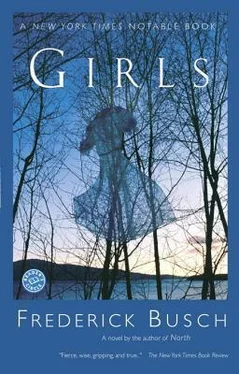Lumber with a red flag stapled to the end of a stud protruded through the open back window. Freezing air and carbon monoxide were sucked in, mixing with what was coming through the floor. I kept the full blast of warm air blowing onto the windshield, I kept the wipers clacking, and I drove slowly, hoping for the best. I got home. Every mile closer to it, I thought I ought to go back for Fanny. She didn’t want me to. I knew that. I thought I should. She knew that.
How good that we knew what we knew.
Our road was getting axle-high in snow, and I thought the town crews would decide to stay in until the snow stopped. Why plow twice?
I answered: Because of Fanny coming home.
I let the dog out, and we stayed outside awhile, tossing snowballs and talking about the day. He butted me in the thigh a few times and dashed around the yard in the snow, then went up on the side porch because it was time to get fed. I poured out his kibble, and after he inhaled it, I let him out again to roam. Then I propped the door open and unloaded the wagon, carrying the materials directly upstairs so I wouldn’t change my mind. It took me quite a few trips. Then I closed the car up, got the mail from the roadside box, brought the dog in, and turned on the porch lights in case Fanny came home early. I turned up the heat so she would be warm.
The studs and firring strips for cleats and pine one-by-tens for shelves were on the hallway floor outside the room, and the plasterboard and compound and drywall tape and sacks of nails and screws were leaning against the hallway door. Inside, there was the closet, the little writing table, the small bed, the shelf unit. We had given the toys and books away. The plan had evolved to this: We would build bookshelves along the long outer wall, we would build a unit of storage shelves along the opposite wall next to the closet, and the room would become a kind of office. Fanny could keep professional records here, and we would do the bills together, she sitting at a desk and I in a rocker. The idea was to make us stop feeling what wasn’t in the room. In our bedroom, or carrying woolens in plastic bags filled with mothballs to store in the big closet at the end of the hall, we felt it. It was like a bruise. If you hurt your arm, you could run your hand along it and then you’d suddenly wince. It was a part of our house that made us wince.
I put down some blue plastic tarpaulins to protect the floor. I brought in extension cords and my circular saw. I made sure the battery in the drill was charged. I looked at the wallpaper that Fanny had put up. She was good with wallpaper. I had forgotten paint. I would have to use the heat gun and a putty knife and take the wallpaper down, because you can’t pay bills and balance your checkbook in any hardheaded way with Bambi smiling at you from the wall.
So I sat on a ladder and, with the heat gun roaring, taking care not to cook the walls or the studs behind them, I took Bambi down, a square at a time. When I let the heat gun focus too long and the wallpaper began to smoke, the smell made me hungry and I remembered I hadn’t eaten dinner or lunch. I thought about Archie Halpern at the Blue Bird and remembered I hadn’t had breakfast, either. I thought I’d start to drool and drip on the heat gun and electrocute myself. The dog waited in the hall, and he escorted me to the refrigerator. There was a plastic-wrapped bowl of noodles with some kind of green peas and cheese and bacon in them. There was another bowl, this one filled with Fanny’s winter vegetable soup. I looked at the cheese in its wrap. I looked at eggs and at pickles in a jar. I took a glass of orange juice and went back upstairs to eliminate Bambi.
I woke up when the heat gun fell out of my hand.
“Okay,” I said. Outside, in the hallway, the dog thumped his tail. I said, “You’re right. It’s a sign. You fall asleep, you know it’s a signal to get a little sleep.” The dog banged back. I unplugged the heat gun, ran my hand along the wall to make sure it was cool. I had taken most of the long wall down; it was a good night’s work. I went down-stairs and sat in the back room with the lights off. I heard the snow hitting the windows, the wind gusting, the tikkety-tak of a dog’s nails on the wooden floor.
I told him, “Come lie down.” He hit the floor beside the sofa. I lay down on it and said, “I’ll get you out to pee later on. You let me know if I forget.” His tail thumped twice. I closed my eyes and felt the day.
Days.
Longer than that.
I let my breath go out and out and out. I said, my mouth so tired that I barely moved it, “Thank you, God, for all this shit you’ve given us, you son of a bitch.” I waited. I waited a minute more as my arms and legs got heavy while my brain filled like a sail with what I was thinking. “You son of a bitch,” I said. I got up, went to the side door, and let the dog out. I made myself some toast and, when I couldn’t decide what to spread on it, I ate it dry. When the dog came in, I went back up and worked on stripping the walls.
IHEARD A ROARING sound in the road and I woke up on the floor of the room. The dog was beside me, waiting. At the window, I saw the wrecker drive off, yellow lights whirling. He had left Fanny’s car outside our little drive. The road was unplowed and so was the drive. When the town plows did come, they’d have to detour her car, but they would, and there we were, both of us home and nobody killed. I heard her walk slowly through the house. I went into the bathroom, and by the time I came out, the dog had found her and had been released to go outside.
I made coffee while she changed from her uniform. I called in sick.
She came back downstairs while I was doing that, and she said, “What?”
I told the dispatcher, “Tomorrow. Guaranteed.”
Fanny waited. She was wearing jeans and a thick black turtleneck and wool-lined moccasins over woolen socks. She kept rubbing her hands together like she was cold. Her eyebrows were up over her pale face, and her lips looked bitten. Her green eyes were wide. She was waiting to hear bad news.
“I just got too tired,” I said. “It isn’t anything. I got tired.”
“Depression makes you tired,” she said.
“Then everybody I know is tired.”
She smiled a little and nodded.
“Coffee’s up pretty soon,” I said. She sat at the table and folded her hands. “Was it rough?”
“No,” she said. “A lot of car wrecks, nothing too terrible. Did you hear the tow truck?”
“You didn’t get hurt.”
“No,” she said, “no. I’m fine. I came down Potter Road and I wasn’t thinking, I was half back in ER and halfway home, I guess. I did what I always do. I hit the brakes at the last minute, and I sailed through the T junction and into where the plows dropped off these huge loads of snow they were moving. I couldn’t back out.”
“So you went to the farmhouse up there where the vampires live—”
“They were very nice to me.”
“And instead of calling me, you called a stranger from a stranger’s house.”
“The stranger,” she said, “was a tow truck stranger. You do not offer a tow truck, among your attractions.”
“I have towed you out of every other snowbank in the county.”
“I thought you’d be in the shower.”
“Or shaving,” I suggested.
She said, “Balancing the checkbook.”
I said, “We’re joking about this, right? We’re being relaxed and friendly and we’re joking about this?”
“He got me home, Jack. And he was polite and helpful. He kept calling me ma’am.”
“Did you correct him?”
She put her head down on her hands and rolled her head to signify no.
Читать дальше










